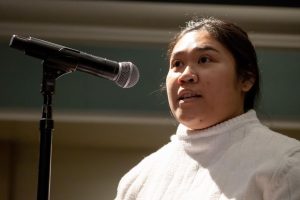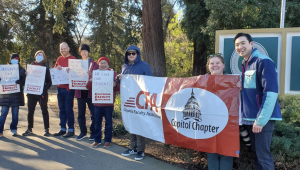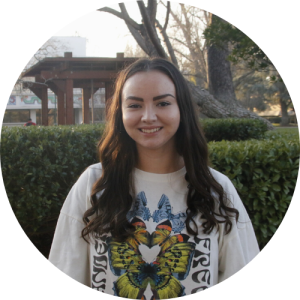ChatGPT’s presence at Sac State: friend or foe
Students, professors offer mixed opinions about AI software
Since the rise in popularity of ChatGPT, an AI chatbot, Sacramento State has been reckoning with how to manage use of the tool. Tom Carroll, Sac State’s Student Conduct Administrator, said students should follow the university’s cheating and plagiarism sections when using ChatGPT for assignments. (Graphic made in Canva by Chris Woodard).
April 18, 2023
With the emergence of ChatGPT, an artificial intelligence chatbot that composes written material, universities across the country are discussing how to adapt to the application’s popularity, including Sacramento State.
Sac State currently does not have an explicit rule in the Academic Dishonesty Policy about the use of AI. However, Tom Carroll, the university’s Student Conduct Administrator, advises students to follow cheating and plagiarism sections when using AI tools.
“ChatGPT is not authorized to be used to write a paper [at Sac State],” Carroll said. “I’m pretty confident that most students know that they’re responsible to write their own papers and do their own work.”
Mark Mina, a third-year interior architecture major, said Sac State should update their existing policy to address specifically what ChatGPT and other AI tools can be used for.
He said students need to balance their use of ChatGPT. While the application has its flaws, it can also help with the writing process including “finding helpful sites for research,” Mina said; even then, the application has its risks.
“It’s kind of weird because some people are too reliant on [ChatGPT],” Mina said. “But sometimes there are good uses to it.”
Angelica Lopez, a fourth-year biomedicine major, said the current Academic Dishonesty policy Sac State has in place does a good job at eliminating plagiarism.
She agrees with Mina, saying there are potentially good uses of ChatGPT if used for sourcing and researching for writing assignments instead of plagiarizing entire assignments.
“[Students should] use it as a way to get examples,” Lopez said. “But [should] not use it for an essay they turn in.”
Shalveen Bains, a third-year health science major, said Sac State should not allow ChatGPT or similar AI tools in any capacity.
Bains said one of her professors decided to not do the required paper this semester because of ChatGPT. The instructor reasoned that last semester, 10 students in the class turned in an AI generated paper.
Bains was told by that professor the papers generated by the AI software were “C-level” and didn’t appear to be researched very well.
Carroll said assignments turned into Canvas are often checked by Turnitin to verify originality and uncover any forms of plagiarism, making it difficult for students to successfully get away with plagiarizing assignments, although, he said it’s likely any work done using AI programs like ChatGPT would be flagged automatically.
Carroll said there is an appropriate use of ChatGPT as a tool in schoolwork for students and in delivering curriculum for instructors.
He encouraged students to ask their professors what the class policies are before using ChatGPT.
In response to ChatGPT potentially taking over students’ work, Carroll said the university is not anticipating AI being a campus-shifting tool at this point. He did say if it were to happen, Sac State would address it.
“It wouldn’t be smart to test the waters, because you could be violating the Academic Honesty policy,” Carroll said.



































































































































